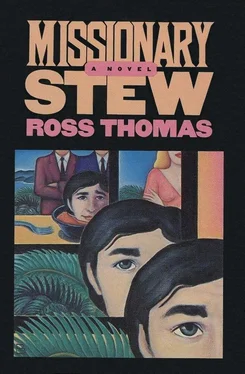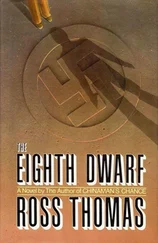Ross Thomas - Missionary Stew
Здесь есть возможность читать онлайн «Ross Thomas - Missionary Stew» весь текст электронной книги совершенно бесплатно (целиком полную версию без сокращений). В некоторых случаях можно слушать аудио, скачать через торрент в формате fb2 и присутствует краткое содержание. Город: New York, Год выпуска: 1983, ISBN: 1983, Издательство: Simon & Schuster, Жанр: Политический детектив, на английском языке. Описание произведения, (предисловие) а так же отзывы посетителей доступны на портале библиотеки ЛибКат.
- Название:Missionary Stew
- Автор:
- Издательство:Simon & Schuster
- Жанр:
- Год:1983
- Город:New York
- ISBN:978-0-671-49363-9
- Рейтинг книги:3 / 5. Голосов: 1
-
Избранное:Добавить в избранное
- Отзывы:
-
Ваша оценка:
- 60
- 1
- 2
- 3
- 4
- 5
Missionary Stew: краткое содержание, описание и аннотация
Предлагаем к чтению аннотацию, описание, краткое содержание или предисловие (зависит от того, что написал сам автор книги «Missionary Stew»). Если вы не нашли необходимую информацию о книге — напишите в комментариях, мы постараемся отыскать её.
Missionary Stew — читать онлайн бесплатно полную книгу (весь текст) целиком
Ниже представлен текст книги, разбитый по страницам. Система сохранения места последней прочитанной страницы, позволяет с удобством читать онлайн бесплатно книгу «Missionary Stew», без необходимости каждый раз заново искать на чём Вы остановились. Поставьте закладку, и сможете в любой момент перейти на страницу, на которой закончили чтение.
Интервал:
Закладка:
One man shot the busboy three times; the other man shot him twice. The old Buick sped away and a woman screamed. Some café patrons rose and began to race toward the cathedral, either to hide or to pray. Others ducked beneath the café tables. There were more screams and shouts. One man cursed steadily in a low, calm voice. Haere watched as one of the two gunmen knelt by the fallen busboy and shot him through the neck. Haere wondered why, since the bus-boy already seemed quite dead.
The kneeling man rose and said something to the other gunman. Both turned to look at Haere. Still staring at him, they slowly put their short-barreled revolvers away in small belt holsters. They entered the café, made their way through the tables, and stopped at Haere’s. He saw that they were younger than he had thought, neither of them much more than twenty-five. Their black eyes seemed bottomless. Neither wore any identifiable expression, although one of them, Haere noticed, was a mouth breather. The mouth breather was the one who had knelt and shot the busboy through the neck.
“Do you understand Spanish?” the mouth breather asked.
Haere nodded. “A little.”
“Good. Leave our country. Today.”
“Do you understand that?” the other one asked.
“Yes,” Haere said. “I understand.”
“Good,” the mouth breather said. They stared at Haere for a moment longer, then turned and walked back through the tables to the sidewalk and over to where the busboy still lay. A new green Volvo sedan pulled up. The driver popped the trunk latch. The two gunmen bent down, picked up the dead busboy, and folded him away into the Volvo’s trunk. They slammed the lid down, turned, gave Haere another thoughtful look, and then climbed into the rear seat. The Volvo sped away.
Haere rose. His knees felt as if they were going to give way, so he leaned on the table, his head down, gulping great gasping breaths. When the trembling finally subsided, he looked up. People were staring at him. They had all edged away until none was closer than twenty feet. Haere moved slowly through the café tables and onto the sidewalk. He looked down at the spot where the dead busboy had fallen. There was a large thick smear of blood. Haere stared down at it for several seconds, then slowly turned and started walking west toward the Inter-Continental.
In the Presidential Palace, Morgan Citron had been kept waiting for almost an hour in an anteroom just outside a pair of sixteen-foot-high doors through which Tighe and Yarn had gone. Citron did not wait alone. Seated across the room from him were a young uniformed captain and an even younger lieutenant, both armed with M-16 rifles. The rifles were pointed at Citron, one at his head, the other at his stomach. The fingers of the two young officers were on the triggers. The safeties were off. Citron sat virtually motionless, remembering that the last time he had gone through such a pair of doors, he had been given a diamond. This time he expected no gift.
One of the sixteen-foot-high doors opened and Tighe appeared. “Okay, Morgan.”
Citron rose and followed Tighe through the immense door and into a room that was too large for any conceivable purpose other than a state ball. It was a dark room, made even darker by the heavy curtains that covered a long row of windows. Citron suspected the windows looked out over the grounds that led to the street. The entire room was paneled in a wood so dark it seemed almost black. The paneling only added to the gloom.
Citron followed Tighe across several large, old, and very expensive looking oriental rugs and past a long library table that held the current issues of the Economist, Business Week, Time, National Geographic , and People . Citron read the magazine’s names as he moved past the table and toward the desk at the room’s far end. The desk was the size of a dining table that would seat twelve comfortably and seemed to have been carved out of the same dark wood used to panel the room.
On the front right corner of the desk, his legs crossed, his hands clasping one knee, perched Colonel-General Rafael Carrasco-Cortes. Three leather armchairs were pulled up in front of the desk. Yarn was seated in one of them. Carrasco-Cortes smiled at Citron and gestured toward the center chair. “Please,” he said. Citron took the center chair and Tighe sat down next to him.
“So,” the General said. “You are Gladys’s son, hmm?”
Citron nodded. The general sighed. “Whatever are we to do with you, hmm?”
“Why not put me on the next plane out?”
The general smiled and eased himself off the edge of the desk. He was not wearing a uniform. Instead, he wore a dark-blue pinstripe suit with a vest and a white shirt and a blue-and-gray-striped tie. As he moved around behind the desk, Citron wondered if the general and Draper Haere bought their suits at the same store.
The general sat down, opened a drawer, took out a piece of Kleenex, removed his rimless bifocals, and began to polish them. Without the glasses, his eyes looked almost bewildered. Citron knew that they weren’t.
Still polishing away, the general said, “I’m going to ask you to do something, Morgan.” He looked up. “I hope you don’t mind if I call you Morgan, but I’ve known your remarkable mother for so many, many years that calling you Mr. Citron makes me feel — well, old.” He smiled and slipped the glasses back on.
“What’re you going to ask me to do?” Citron said.
“I’m going to ask you to tell me exactly what you told our two friends here earlier.”
Citron looked at Yarn. “This isn’t quite the way it was supposed to go.”
Yarn shrugged. “All bets are off.”
“You see, Morgan,” the general said, “what I’m trying to decide is whether to have you shot. I must confess that at the moment I’m leaning in that direction. This little session here will be, in effect, your trial — although I suppose court-martial would be more accurate.”
Tighe turned to Citron with a grin. “I’m your defense attorney.”
Citron nodded, turned to Yarn, and said, “What’re you — the prosecutor?”
“Right,” Yarn said.
“What’s the charge?”
“We’re going for espionage and see what happens.”
The general took a large gold watch from his vest pocket, snapped its cover open, and placed it on the desk. “Could we begin with your statement, Morgan, hmm? I do have a rather busy schedule today.”
“I don’t have much choice, do I?”
“None,” Tighe said.
“You put up a great defense.”
Tighe shrugged. Citron looked at the general, who was now leaning back in his chair, his hands steepled in front of him. “All right,” Citron said, “I’ll tell you what I know, what I think I know, and what I suspect. A lot of it’s conjecture.”
“Of course,” the general said and nodded encouragingly.
“After you lined the President up in front of the wall out there and shot him, you found that the coffers were bare. The country was bankrupt and you needed money. As I recall, before your coup the country was divided, mostly for administrative purposes, I guess, into two states or regions — the Eastern Region and the Western Region. You carved it up into thirty-two regions and parceled them out to the other generals according to seniority. You kept the largest region — the capital — for yourself.”
“All this is common knowledge,” the general said.
“A lot of what I know is only that — common knowledge.”
The general nodded. “Continue.”
“You needed money,” Citron said. “You needed it for yourself and to pay your troops and to keep a semblance of order. But because of your human-rights record, which I think is usually called ‘appalling,’ Washington was out. They couldn’t lend or give you a dime. Congress wouldn’t let them. So you turned to your friends in the CIA. You do have friends in the CIA, don’t you, general?”
Читать дальшеИнтервал:
Закладка:
Похожие книги на «Missionary Stew»
Представляем Вашему вниманию похожие книги на «Missionary Stew» списком для выбора. Мы отобрали схожую по названию и смыслу литературу в надежде предоставить читателям больше вариантов отыскать новые, интересные, ещё непрочитанные произведения.
Обсуждение, отзывы о книге «Missionary Stew» и просто собственные мнения читателей. Оставьте ваши комментарии, напишите, что Вы думаете о произведении, его смысле или главных героях. Укажите что конкретно понравилось, а что нет, и почему Вы так считаете.












